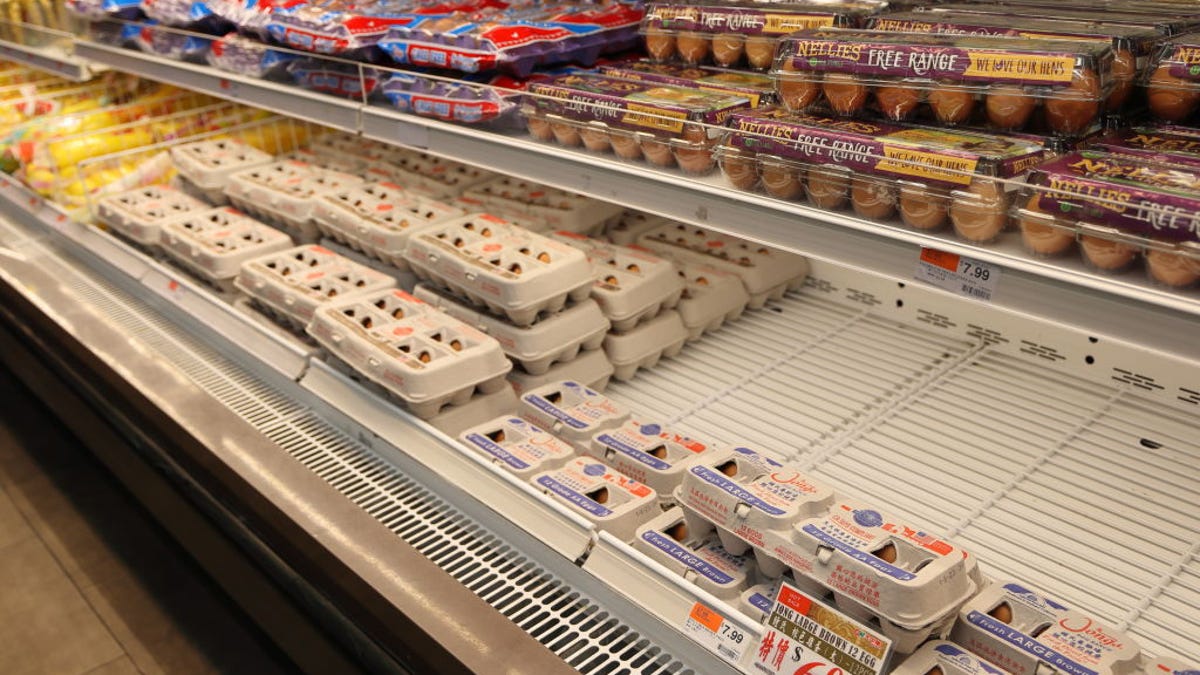Here's Why Eggs Are So Expensive Right Now
Egg prices have gone up 60% in some parts of the country.

An ongoing bird flu epidemic has forced farmers to kill millions of egg-laying hens, leading to a serious shortage.
In December, the cost of eggs rose 59.9% year-over-year, according to the most recent Consumer Price Index, which tracks changes in the cost of household goods. The CPI also indicated an 11.1% price increase from November to December alone.
In the Midwest, a dozen large eggs cost an average of $5.17 last week, compared with roughly $1.50 in January 2022 and 94 cents in 2021.
That spike has been driven by a virulent strain of bird flu that's resulted in the deaths of nearly 58 million chickens and turkeys since early 2022, according to the US Department of Agriculture. Most of the birds culled to stop the epidemic have been egg-laying hens, causing the price of eggs to skyrocket and availability to plummet.
Here's what you need to know about the situation, including how expensive eggs are getting across the nation and when prices could come back down.
Read On: Does Bird Flu Pose a Risk to Humans?
What is bird flu?
Birds infected with avian influenza will stop drinking water and become lethargic.
Bird flu is caused by avian influenza Type A viruses, which spread among waterfowl and can infect other wild birds, domestic poultry and other animals, although rarely humans. (To date, just one person has tested positive in the US during the current outbreak.)
There are more than a dozen strains of bird flu, classified as either "low pathogenic" or "highly pathogenic," depending on their ability to spread and kill birds.
The strain bombarding the US right now, Eurasian H5N1, is considered highly pathogenic. It infects birds' respiratory and gastrointestinal tracts and can quickly tear through an entire flock. Symptoms include a lack of appetite, lethargy, swelling and reduced egg production.
The main source of infection is ducks, geese and other migratory waterfowl, Denise Derrer, public information director for the Indiana State Board of Animal Health, told CNET.
"They get infected but don't get sick," Derrer said. "Then they shed the virus in their droppings or wherever the land."
The USDA confirmed the first commercial case in the US last February in a turkey flock in Indiana. Since then, 57.8 million egg-laying hens, poultry chickens and turkeys in 47 states have been destroyed by farmers or killed by the virus.
How is bird flu affecting egg prices?
Inflation, labor shortages and supply chain issues have contributed to higher grocery prices across the board. But bird flu outbreaks are adding a premium to the price of eggs.
In California last week, the average price for a dozen eggs reached $7.37, according to the USDA's Egg Market Overview report. That's more than triple the $2.35 they cost a year ago.
Though demand for eggs has dipped from the holiday season, the USDA said, "consumers are looking to modify their dietary choices to support freshly-minted healthier lifestyle resolutions and eggs remain a popular go-to option."
Customers in some states are facing empty shelves and certain supermarkets have started limiting how many cartons customers can purchase, including branches of Whole Foods, Lidl, Kroger and Fred Meyer.
It isn't just eggs
An egg shortage is fueling rising costs of related products, including mayonnaise.
The spike in egg prices is also impacting products made with eggs, including bread, cake and salad dressing.
The cost of mayonnaise has risen 18.2% since this time last year, according to the new CPI report. When you consider that the overall CPI was 5.7%, that's a major outlier.
When will egg prices go down?
There are some signs the situation is improving: The Midwest wholesale price for large eggs delivered to warehouses was $5.17 a dozen last week, a 13-cent decrease.
The national wholesale average for a dozen eggs was $3.30 -- still well above the $1.93 average from January 2022 but down from the nearly $3.59 reported in November 2022.
"Recent record high egg prices have begun to soften but it will take some before this is reflected at the dairy case," the USDA said in its newest report.
Eleven percent more eggs were delivered to stores last week than the week prior, according to the Egg Market Overview, and schedule deliveries are up 14%, as well.
Sonja Sharp, a Metro reporter with the Los Angeles Times, told CBS News Moneywatch on Monday that prices probably won't return to historic norms until the outbreaks have passed and baby chicks can reach egg-laying age -- perhaps into the summer.
"We don't get mature hens overnight," Sharp said.
The last major bird flu epidemic
Between December 2014 and June 2015, the first bird flu epidemic in the US led to more than 50 million birds being destroyed, including one in eight egg-laying hens, according to Gro Intelligence. Eighty percent of the birds -- some 39 million -- were euthanized between mid-April and mid-May 2015 alone.
Prices quickly soared as a result, with the cost of eggs nearly doubling and the price of wholesale chicken breast prices remaining inflated for years, according to the USDA's Economic Research Service.
Although the agency called the 2014-2015 epidemic "the largest poultry health disaster in US history" the current outbreak has already lasted longer and resulted in the deaths of more birds.

